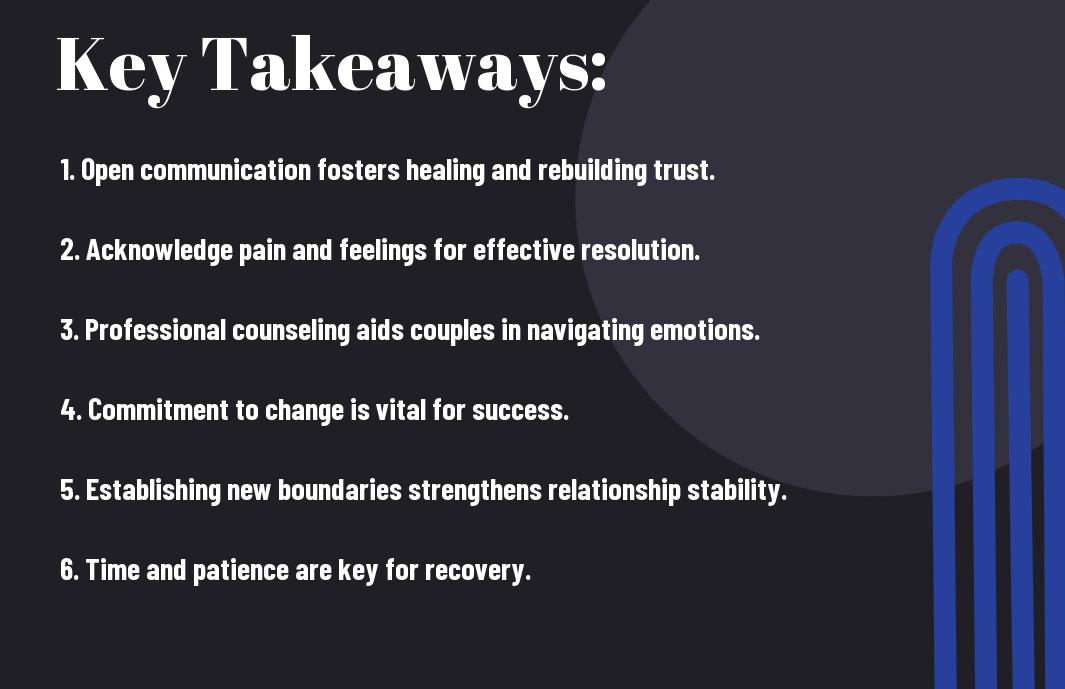Infidelity can feel like the end of your marriage, unraveling the trust and stability you once knew. However, experts believe that healing is possible and that many couples who face this challenge can emerge stronger than before. By engaging in open communication, working through emotions, and seeking professional guidance, you can rebuild your relationship on a healthier foundation. In this post, we will explore practical strategies to help you navigate the complex journey of recovery, allowing you to determine if your marriage can truly thrive after a betrayal.
Key Takeaways:
- Infidelity can lead to opportunities for growth and deeper understanding in a marriage when addressed openly.
- Effective communication is vital for rebuilding trust and intimacy after an affair.
- Couples therapy or counseling can provide a structured environment for healing and resolution.
- Both partners must actively engage in the healing process for the relationship to move forward.
- Setting boundaries and establishing new relationship guidelines is important to prevent future infidelity.
- Forgiveness is a vital part of the recovery process and can take time to achieve.
- Many couples who work through infidelity report stronger bonds and a more resilient relationship in the long run.

Understanding Infidelity
Your journey towards healing after infidelity starts with understanding what it entails. Infidelity is often more than a physical act; it represents a breach of trust in the relationship. Knowing the underlying reasons and motivations behind such actions can help partners navigate the complicated emotions involved and rebuild their connection.
Types of Infidelity
Your awareness of the different types of infidelity can aid in understanding each partner’s feelings. Here are some common forms:
- Emotional Infidelity – forming a deep emotional bond with someone outside the relationship.
- Physical Infidelity – engaging in sexual relations with another person.
- Online Infidelity – developing emotional or sexual relationships through digital mediums.
- Physical Affairs – sexual relations without the emotional involvement.
- Micro-cheating – minor actions that may indicate romantic interest outside the primary relationship.
Any of these types can deeply affect your relationship’s foundation.
Psychological Impact on Partners
Across many couples, infidelity can lead to various psychological impacts that may linger long after the betrayal. Feelings of confusion, anger, and sadness are common as both partners grapple with their emotions.
Understanding the psychological turmoil inflicted by infidelity is vital. You may experience a range of emotions, from self-doubt and betrayal to anxiety and lingering trust issues. Effectively dealing with these feelings requires open communication, counseling, and a commitment to moving forward. It’s vital to acknowledge not only your pain but also your partner’s suffering. Healing can occur when both partners address these underlying issues, offering the possibility of stronger, healthier relationships in the future.
Reasons for Staying Together
Clearly, couples may choose to stay together after infidelity for a variety of reasons. Many find it difficult to forsake the years of shared experiences, love, and support that form the foundation of their relationship. The decision to stay is often driven by a desire to rebuild the trust that was lost and to grow together in ways that deepen their bond, ultimately believing that love can prevail.
Love and Commitment
Below, some couples discover that the love and commitment they originally had for each other can endure, even in the wake of betrayal. This enduring affection sometimes motivates partners to work through the pain and complexity of infidelity, seeking to reignite the passion and trust that once united them. With open communication and dedication, rebuilding the emotional connection can become a powerful catalyst for healing.
Family Considerations
Above all, the impact of infidelity on family dynamics often weighs heavily on a couple’s decision to stay together. Many individuals consider the well-being of their children and how a separation might affect their lives. The desire to provide a stable and loving environment for your family can lead to a commitment to work through difficulties, striving for forgiveness and renewal.
And it’s crucial to recognize that children can greatly benefit from stability in their family life. Staying together may promote a sense of security and continuity that can be vital during turbulent times. However, it’s important to approach this situation with honesty and transparency; if tensions and unresolved issues persist, they could harm your children emotionally in the long run. Note, nurturing healthy communication and conflict resolution skills within your family enhances the chances of successfully navigating through the aftermath of infidelity.

Steps to Rebuild Trust
After experiencing infidelity, it’s imperative to take intentional steps to rebuild trust within your relationship. This process requires both partners to dedicate themselves to emotional honesty, open communication, and actions that demonstrate a commitment to change. Establishing accountability and fostering a supportive environment can help cultivate a sense of safety and security as you navigate this challenging journey together.
Open Communication
On your journey to rebuild trust, engaging in open communication is vital. Clear dialogue encourages both partners to express their thoughts and feelings without fear of judgment. This transparency promotes understanding and helps create a safe space for addressing the underlying issues that contributed to the infidelity.
Seeking Professional Help
For many couples, seeking professional help can provide valuable support during the healing process. A trained therapist can guide you through the complexities of rebuilding trust while offering insights tailored to your unique situation.
Trust your instincts when considering therapy; it’s an opportunity to explore your feelings and challenges with an expert. Many couples find that having an objective third party facilitates meaningful conversations and encourages personal growth. A therapist can assist both of you in navigating the emotional pain caused by infidelity and help develop effective coping strategies. Embracing this support can ultimately strengthen your bond and lead to a healthier, more resilient relationship.
Strategies for a Successful Marriage Post-Infidelity
Many couples find it challenging to rebuild their relationship after infidelity, but with the right strategies in place, it can definitely work. Focus on open communication, fostering trust, and nurturing emotional connections to pave the way for renewed intimacy and understanding. By applying these strategies, you can transform your relationship into a healthier, stronger partnership.
Setting New Boundaries
Among the first steps to healing is establishing new boundaries that honor both partners’ feelings and needs. This might include agreeing on transparency about interactions outside the marriage and refining personal space within your emotional and social interactions. Clear boundaries help create a sense of safety and understanding in your relationship.
Cultivating Empathy and Forgiveness
Between the partners, fostering mutual empathy and granting forgiveness is crucial for long-term healing. Acknowledging the pain and hurt experienced by both sides can lead to a deeper connection and understanding. You must provide a safe space for each other’s feelings, allowing vulnerability to flourish.
Boundaries are crucial for rebuilding trust and establishing a healthy relationship post-infidelity. Communicate openly about what each of you needs to feel safe and respected, setting clear expectations that you can both adhere to. This process helps create a transparent environment where you can both express your emotions without fear of judgment. Simultaneously, cultivating empathy is vital in understanding your partner’s emotional landscape. Strive to genuinely listen and validate their feelings, which fosters forgiveness and can mend the rift created by infidelity. Ultimately, this powerful combination of boundaries and empathy can usher in a more resilient and fulfilling connection.

Real-Life Success Stories
Once again, it’s important to recognize that healing is possible. Many couples have triumphed over infidelity and successfully rebuilt their relationships. In fact, Can a Marriage Heal After an Affair highlights stories of those who not only regained trust but also deepened their connection post-crisis. These success stories serve as a testament to resilience and the human spirit, emphasizing that with commitment, it is possible to transform pain into growth.
Couples Who Overcame Infidelity
Between therapy sessions and open dialogues, couples have emerged stronger after experiencing infidelity. By addressing the underlying issues and fostering communication, they found a renewed sense of intimacy. Support systems, whether through friends or professional help, played a significant role in their healing journey.
Lessons Learned from Their Experiences
Infidelity can serve as a turning point, prompting valuable lessons in trust and communication. Each couple’s journey teaches you the importance of vulnerability and honesty. As they navigated their challenges, they discovered that understanding one another’s emotions paved the way for growth.
This process can highlight the strength of your relationship. Active communication is crucial in addressing wounds; closing off only deepens the divide. Couples learned to prioritize emotional openness and set boundaries that protect their relationship from future breaches. Moreover, they acknowledged the necessity of forgiveness, allowing both partners to heal. Engaging in shared activities helped rekindle connection and reinforce a commitment to moving forward together, providing you with a blueprint for resilience.
Expert Insights
All advice from experts in the field emphasizes that while rebuilding trust after infidelity is challenging, it is indeed possible. Engaging in open communication, understanding the underlying issues, and committing to growth can lead to a stronger union. Experts encourage couples to seek professional help to navigate the complex emotions surrounding infidelity.
Therapist Perspectives
Below are insights from therapists who specialize in marital recovery. They highlight the importance of acknowledging pain, expressing feelings openly, and working together toward healing. Through guided therapy, couples learn to develop empathy and reconnect on a deeper emotional level, which is necessary for moving forward.
Research Findings on Marital Recovery
By delving into various studies, you will find that many couples successfully navigate the aftermath of infidelity. These findings show that approximately 60% to 75% of couples who sought therapy after an affair reported significant improvements in their relationships. However, high levels of trust and communication are critical for recovery.
Considering these research findings, it is imperative to approach marital recovery with a willingness to heal and a proactive attitude. Couples who engage in therapy often demonstrate a remarkable ability to rediscover love and rebuild their relationship. Those who focus on open communication and mutual respect are likelier to emerge from this painful experience with a stronger bond. Knowing that many have successfully navigated this challenging journey can provide hope and motivation as you seek to rebuild your relationship.
Conclusion
Presently, overcoming infidelity in your marriage is possible, and experts affirm that it can lead to stronger relationships. By taking proactive steps, such as open communication and seeking therapy, you can rebuild trust and intimacy. It’s important to acknowledge the challenges ahead, but with commitment and effort from both partners, your relationship can emerge healthier and more resilient. Embrace this opportunity for growth, and you might find that your marriage can flourish even after betrayal.
FAQ
Q: Can a marriage survive infidelity?
A: Yes, a marriage can survive infidelity. Many couples have successfully navigated the aftermath of an affair by addressing the underlying issues that led to the betrayal. Effective communication, counseling, and a mutual commitment to rebuilding trust are key components in healing and moving forward together.
Q: What steps should couples take after infidelity?
A: After infidelity, couples should first engage in open and honest communication. This may involve seeking professional help from a therapist who specializes in infidelity and relationship issues. Both partners should express their feelings, listen to each other, and establish boundaries. It’s imperative to work on rebuilding trust gradually, which requires consistency and accountability from the partner who has been unfaithful.
Q: How long does it take to heal from infidelity?
A: The healing process after infidelity varies for each couple. Some may start to feel more secure in their relationship within a few months, while others may take years to fully heal. Factors influencing this timeline include the severity of the affair, individual emotional responses, and the couple’s commitment to addressing their issues and working on their relationship. Patience and understanding from both partners are necessary during this time.
Q: Are there specific strategies that can help couples rebuild trust?
A: Yes, several strategies can aid in rebuilding trust after infidelity. These include creating a safe space for open discussions about feelings and concerns, keeping promises and being consistent in actions, and regularly checking in with each other about progress. Additionally, being transparent about daily activities and sharing emotions can help bridge the gap created by distrust.
Q: What role does forgiveness play in moving forward after infidelity?
A: Forgiveness is a vital aspect of moving forward after infidelity, but it’s not something that can be rushed. It involves both partners working through feelings of betrayal and anger. The betrayed partner must process their emotions, while the unfaithful partner must take responsibility and show genuine remorse. Ultimately, forgiveness can lead to personal healing and the chance to rekindle a deeper connection in the relationship, provided both partners are willing to engage in this process.
